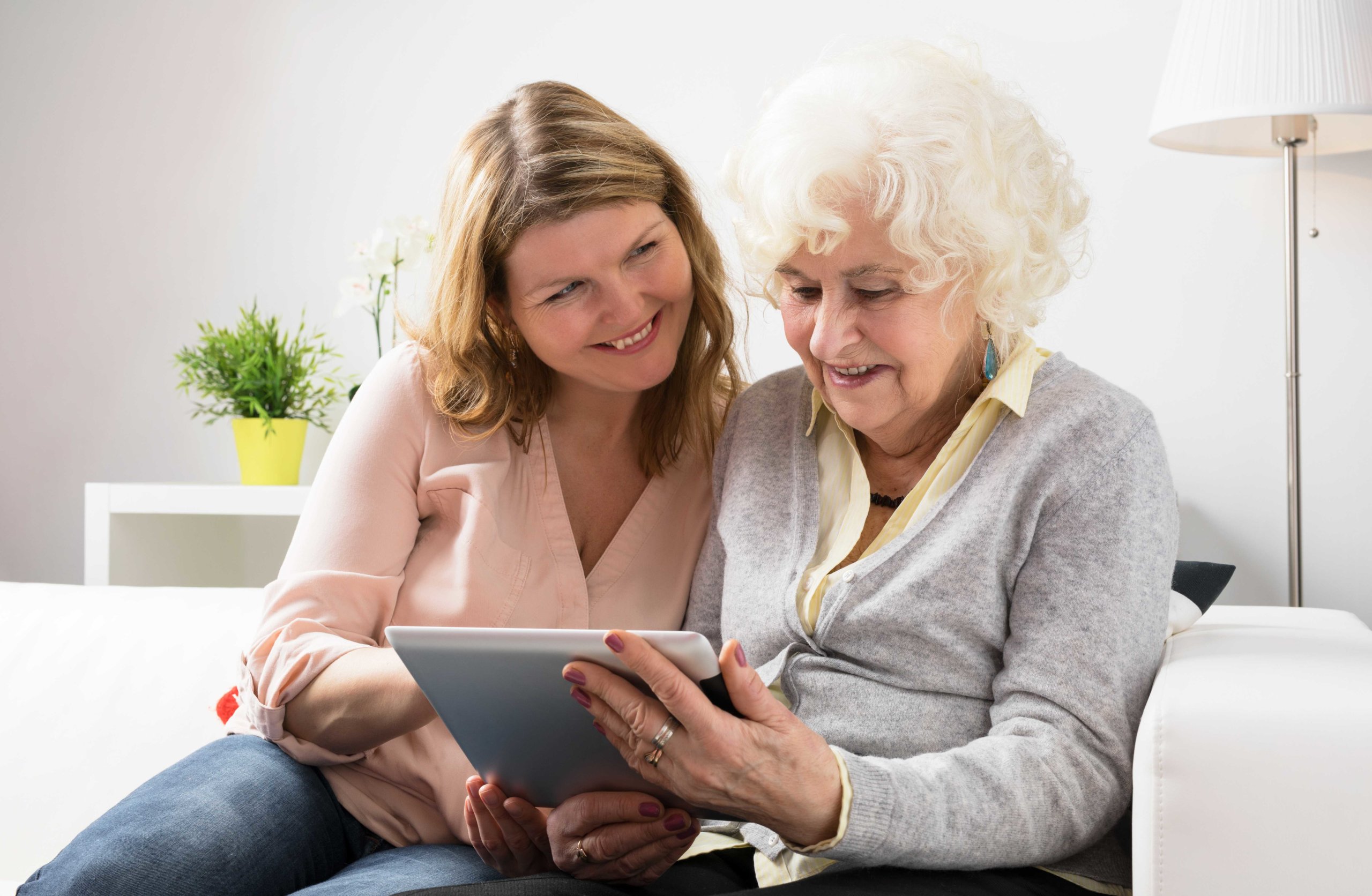How to talk to older relatives about making their home safer

There are taboo subjects in most families: money, politics, religion, but also... ageing. In fact, most of us would actively avoid discussing retirement plans or future senior living arrangements with our own parents over a cup of tea. But is it really better to wait until the last minute to discuss these topics, when it’s often too late? The UK population is ageing quickly and the need for elderly care and support is increasing. In 2037, it is estimated that the number of informal carers will increase to 9 million. So, it might be about time that we sit down with our parents and relatives to understand what their needs are.
At Premier Care in Bathing, we asked 10 influencers the same question: “How do you talk to older relatives about making their home safer for them?” Each had a chat with one of their older relatives – mums, dads, grans, aunts and others – to understand better what their concerns are and what home modifications they’re planning for their later years.
Here is some of their advice for talking with parents about home adaptions.
First, determine what their plans are
Rather unsurprisingly, most of the influencers reported that their parents wished to stay home as long as possible.
“I have talked with family about this many times. I have made it clear that I want to continue to live in my own home for as long as possible, I really don't want to live in a care home.” (Alina’s aunt, We Made This Life)
Some were even quite adamant about it:
“We are staying here forever, as long as we are able to manage it. […] So long as I am continent and able to move around OK, I don’t see any problems.” (Talya’s dad, Motherhood Real Deal)
That being said, most agreed that it would ultimately come down to whether they could live independently, without requiring 24/7 assistance.
“I’d like to live with my family, but only if I wouldn’t be a burden. If I need medical care or assisted living treatment on a daily basis, I wouldn’t want to have to add that onto my families worries. I would consider assisted living if that was the case. But if not? And I was well, healthy, but just old? Then I’d be happy to stay at home or living with family.” (Deborah’s dad, Super Busy Mum)
Some also said that this would depend on their personal situation as well as other people.
“[My dad’s] response was that if my step mum was the first to go and he was left alone, he would definitely consider sheltered housing. He said: “We have a friend who manages a complex, and her mother is in another one, and we can see the benefit.”” (Talya, Motherhood Real Deal)
“The very best way of supporting someone is to be open and frank about what they feel and what they need. For us this is no longer a taboo subject and it feels respectful and useful to have opened up this dialogue.”
Work together to identify areas of the house that could become a problem
As we grow older, areas of the house and specific items of furniture might pose a risk to those less steady on their feet. In fact, falls and fractures are a common and serious health issue faced by older people in England. People aged 65 and older have the highest risk of falling; around a third of people aged 65 and over, and around half of people aged 80 and over, fall at least once a year.
Many of our participants said they had (or wanted to) improve their bathrooms with adaptations or aids such as shower seats or bath lifts:
“My mum immediately said that the bathroom was an area that actually frightened her because of the possibility of slipping while showering. This meant that we needed to completely renovate the bathroom and turn it into a safe environment with a shower and non-slip floors.” (Nigel, DIY Daddy)
“I think I will look at putting handrails in the bathroom and an extra one on the stairs. I have also thought about converting a downstairs room into a toilet / wet room.” (Alina’s aunt, We Made This Life)
Going up and down the stairs was an area of concern for several of our families. Many also mentioned they would add a ramp or a handrail in strategic places of the house if they had mobility issues.
Being open with your relative and discussing what both of you think could become a problem is an important step towards taking measures to resolve the issue.
Claire from Life, Love and Dirty Dishes found out that her and her mum had very different ideas about what could become challenging:
"For my mum, keeping on top of the garden, and the running costs of a larger home, was the biggest concern, while my concern would be more around mobility. Both mobility around the house, and if driving becomes an issue, getting out and about too.”
It is worth taking the time to find out more about the daily routines of our loved ones, in order to spot the areas where things might get riskier if they are dealing with restricted movement.
“Personally speaking, once my mum and I started to discuss her various options, it felt positive as it meant I understood her wishes for the future and I could support her accordingly."
Next, research the type of home adaptations available
As with any other topic, information is key. Gather as much information as you can about the type of home adaptations you can purchase/install, the cost and the impact on the rooms in question. You might find out that your relative has already researched it or might even be willing to do it themselves.
“I have always been a tinkerer and always have my next DIY project in mind before my current one is completed. That’s always been my way. I don’t think me and the word relax know how to get along. But yes, I have considered making further home improvements to adapt to my wife and me getting older. Making sure entries through doorways are level, stairs have bannisters, railings for any outdoor steps and so on.” (Deborah’s dad, Super Busy Mum)
Antonia from Family Friendly Working said the turning point was when her mum was injured and realised how much mobility issues could compromise her day-to-day.
“My mother had great views, but it wasn’t the most accessible house as became clear when she broke her ankle. And, even without that, she admitted that she sometimes had problems getting in and out of the bath since a knee replacement.”
“We arranged for the builder to fit a raised toilet seat which makes it easier to get on and off. The bathroom has a walk-in shower, and we got a grab rail and folding seat fitted so Mum could wash sitting down. She says, “I couldn’t manage without this now. I’d recommend a non-slip bathmat too – it gives me confidence.”
Lastly, you can also look into how technology like smart devices or robotics can help improve your relative’s life, or even their feeling of security around the house.
“The most important adaptions are for people who are frail and/or lonely. Robotics seems to hold out a good prospect for them. Falls in the home are a real disaster, and these are often caused by morning dehydration, so having a robot or even just Alexa to tell you to drink when you wake up is important. Smartwatches are proving really helpful for some also.” (Talya’s dad, Motherhood The Real Deal)
“While my mum felt old having the discussion, when she’s only in her early 60’s, it wasn’t an uncomfortable discussion for me to have. It’s one where I needed to know how she felt."
Don’t be afraid to have this talk
Admittedly, talking to your parents about how they’d like to spend their older years isn’t exactly an ‘easy topic’. It can be rather daunting, especially if you’ve never had this conversation before, or if your relatives feel ‘they aren’t quite there yet’.
“Having the conversation with my mum about how and where she wanted to live in her later life initially gave me an uncomfortable feeling. It felt very strange and it actually gave me a feeling of role reversal. Life appeared to have gone full circle where as I was being looked after as a child by her, now I was looking after her in her older years.” (Nigel, DIY Daddy)
“In all honestly, I’d rather not have [this conversation]. But who would that help? Not my family and certainly not my wife or myself. So, having it just needs to be done at the end of the day.” (Deborah’s dad, Super Busy Mum)
But once you’ve passed this feeling of awkwardness, the discussion can turn out to be pretty constructive. “Once we started talking and having the discussion about safety in her home it actually got easier and she was very quick to explain her fears and worries about living at home on her own.” (Nigel, DIY Daddy)
“I think our conversation was really productive. It felt like an awkward issue to raise because I didn't want her to think that we thought that she couldn't cope at the moment. […] I think it is a great thing for people to open the conversation on this topic, ideally before something bad happens so that you know what your loved one would want for themselves in any situation.” (Alina, We Made This Life)
Antonia from TidyLife said that choosing a sensible moment and the right conversation trigger is key to make sure that it doesn’t come across as hurtful or offensive.
“Timing an initial chat depends on things like how old your parents are and their state of health. It doesn’t have to be a heavy conversation, it could be a simple question over a cup of tea; Have you ever thought about where you will be living when you get older?” (Antonia, Tidylife)
“The very best way of supporting someone is to be open and frank about what they feel and what they need. For us this is no longer a taboo subject and it feels respectful and useful to have opened up this dialogue.” (Becky, Family Budgeting)
“I perhaps suggest not opening with the line: ‘I hope you aren’t going to move in with me?’ with a poorly hidden look of horror upon your face.” (Tania, Larger Family Life)
Maybe it’ll spark new conversations
In the end, most of the participants reported that talking with their relatives helped open up the conversation about home adaptations for elderly people.
“I think that our conversation sparked a few thoughts in her head so she might start finding out some more about what home adaptations could be available to her, and even look into assisted living options” (Alina, We Made This Life)
In some cases, it also raised other questions such as distance, or even legal questions such as decision-making in older age.
“While my mum felt old having the discussion, when she’s only in her early 60’s, it wasn’t an uncomfortable discussion for me to have. It’s one where I needed to know how she felt. What it has highlighted for me is the difficulty I would face in helping, or being there as part of the decision-making process, living abroad.” (Laura, Life with Baby Kicks)
“Personally speaking, once my mum and I started to discuss her various options, it felt positive as it meant I understood her wishes for the future and I could support her accordingly. I think we had the chat at the right time and I’m glad we talked it through because it also opened up other topics, such as power of attorney, which is something I wouldn’t have brought up on its own.” (Antonia, Tidy Life)
If you need help
If you or someone you know needs to talk to a relative about home adaptions, you can find help online. There are a number of charities and organisations offering free advice. Disabled Living Foundation (DLF) or Independent Age offer advice about home adaptations for elderly.
The NHS also offers home assessments if you or someone you know needs help to do everyday tasks or you're worried about falling.
Premier Care in Bathing offers full consultations and end-to-end service to ensure your bathroom is not only safe but stylish and practical for the whole family. Contact us now for more information.


